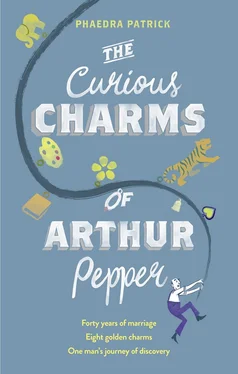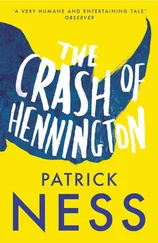Last week he had found a sausage roll in his hallway, peeking out of its paper bag like a frightened animal. It had taken him ages to clear up the flakes of pastry from his hessian welcome mat.
He had to hold his nerve. If he moved now she would know he was hiding. Then he’d have to think of an excuse; he was putting out the bins, or watering the geraniums in the garden. But he felt too weary to invent a story, especially today of all days.
‘I know you’re in there, Arthur. You don’t have to do this on your own. You have friends who care about you.’ The letterbox rattled. A small lilac leaflet with the title ‘Bereavement Buddies’ drifted to the floor. It had a badly drawn lily on the front.
Although he hadn’t spoken to anyone for over a week, although all he had in the fridge was a small chunk of cheddar and an out-of-date bottle of milk, he still had his pride. He would not become one of Bernadette Patterson’s lost causes.
‘ Arthur .’
He screwed his eyes shut and pretended he was a statue in the garden of a stately home. He and Miriam used to love visiting National Trust properties, but only during the week when there were no crowds. He wished the two of them were there now, their feet crunching on gravel paths, marvelling at cabbage white butterflies fluttering among the roses, looking forward to a big slice of Victoria sponge in the tea room.
A lump rose in his throat as he thought about his wife, but he held his pose. He wished he really could be made of stone so he couldn’t hurt any more.
Finally the letterbox snapped shut. The purple shape moved away. Arthur let his fingers relax first then his elbows. He wriggled his shoulders to relieve the tension.
Not totally convinced that Bernadette wasn’t lurking by the garden gate, he opened his front door an inch. Pressing his eye against the gap, he peered around outside. In the garden opposite, Terry, who wore his hair in dreadlocks tied with a red bandanna and who was forever mowing his lawn, was heaving his mower out of his shed. The two redheaded kids from next door were running up and down the street wearing nothing on their feet. Pigeons had pebble-dashed the windscreen of his disused Micra. Arthur began to feel calmer. Everything was back to normal. Routine was good.
He read the leaflet then placed it carefully with the others that Bernadette had posted for him—‘Friends Indeed’, ‘Thornapple Residents Association’, ‘Men in Caves’ and ‘Diesel Gala Day at North Yorkshire Moors Railway’—then forced himself to go and make a cup of tea.
Bernadette had compromised his morning, thrown him off balance. Flustered, he didn’t allow his tea bag enough time in the pot. Sniffing the milk from the fridge, he winced at the smell and poured it down the sink. He would have to take his tea black. It tasted like iron filings. He gave a deep sigh.
Today, he wasn’t going to mop the kitchen floor or vacuum the stairs carpet so hard that the threadbare bits grew balder. He wasn’t going to polish the bathroom taps and fold the towels into neat squares.
Reaching out, he touched the fat black telescope of bin liners that he’d placed on the kitchen table and reluctantly picked them up. They were heavy. Good for the job.
To make things easier he read through the cat charity leaflet one more time: ‘Cat Saviours. All items donated are sold to raise funds for badly treated cats and kittens.’
He wasn’t a cat lover himself, especially as they had decimated his rockery, but Miriam liked them even though they made her sneeze. She had saved the leaflet under the telephone and Arthur took this as a sign that this was the charity he should give her belongings to.
Purposefully delaying the task that lay ahead, he climbed the stairs slowly and paused on the first landing. By sorting out her wardrobe it felt as if he was saying goodbye to her all over again. He was clearing her out of his life.
With a tear in his eye, he looked out of the window onto the back garden. If he stood on tiptoe he could just see the tip of York Minster, its stone fingers seeming to prop up the sky. Thornapple village, in which he lived, was just on the outskirts of the city. Cherry blossom had already started to fall from the trees, swirling like pink confetti. The garden was surrounded on three sides by a tall wooden fence that gave privacy; too tall for neighbours to pop their heads over for a chat. He and Miriam liked their own company. They did everything together and that was how they liked it, thank you very much.
There were four raised beds, which he had made out of railway sleepers and which housed rows of beetroots, carrots, onions and potatoes. This year he might even attempt pumpkins. Miriam used to make a grand chicken and vegetable stew with the produce, and home-made soups. But he wasn’t a cook. The beautiful red onions he picked last summer had stayed on the kitchen worktop until their skins were as wrinkly as his own and he had thrown them in the recycling bin.
He finally ascended the remainder of the stairs and arrived panting outside the bathroom. He used to be able to speed from top to bottom, running after Lucy and Dan, without any problem. But now, everything was slowing down. His knees creaked and he was sure he was shrivelling. His once-black hair was now dove white (though still so thick it was difficult to keep flat) and the rounded tip of his nose seemed to be growing redder by the day. It was difficult to remember when he stopped being young and became an old man.
He recalled his daughter Lucy’s words when they last spoke, a few weeks ago. ‘You could do with a clear out, Dad. You’ll feel better when Mum’s stuff is gone. You’ll be able to move on.’ Dan occasionally phoned from Australia, where he now lived with his wife and two children. He was less tactful. ‘Just chuck it all out. Don’t turn the house into a museum.’
Move on? Like to bloody where? He was sixty-nine, not a teenager who could go to university or on a gap year. Move on. He sighed as he shuffled into the bedroom.
Slowly he pulled open the mirrored doors on the wardrobe.
Brown, black and grey. He was confronted by a row of clothes the colour of soil. Funny, he didn’t remember Miriam dressing so dully. He had a sudden image of her in his head. She was young and swinging Dan around by an arm and leg—an aeroplane. She was wearing a blue polka dot sundress and white scarf. Her head was tipped back and she was laughing, her mouth inviting him to join in. But the picture vanished as quickly as it came. His last memories of her were the same colour as the clothes in the wardrobe. Grey. She had aluminium-hued hair in the shape of a swimming cap. She had withered away like the onions.
She’d been ill for a few weeks. First it was a chest infection, an annual affliction which saw her laid up in bed for a fortnight on a dose of antibiotics. But this time the infection turned into pneumonia. The doctor prescribed more bed rest and his wife, never one to cause a fuss, had complied.
Arthur had discovered her in bed, staring, lifeless. At first he thought she was watching the birds in the trees, but when he shook her arm she didn’t wake up.
Half her wardrobe was devoted to cardigans. They hung shapeless, their arms dangling as if they’d been worn by gorillas, then hung back up again. Then there were Miriam’s skirts; navy, grey, beige, mid-calf length. He could smell her perfume, something with roses and lily of the valley, and it made him want to nestle his nose into the nape of her neck, just one more time please, God. He often wished this was all a bad dream and that she was sat downstairs doing the Woman’s Weekly crossword, or writing a letter to one of the friends they had met on their holidays.
He allowed himself to sit on the bed and wallow in self-pity for a few minutes and then swiftly unrolled two bags and shook them open. He had to do this. There was a bag for charity and one for stuff to throw out. He took out armfuls of clothes and bundled them in the charity bag. Miriam’s slippers—worn and with a hole in the toe—went in the rubbish bag. He worked quickly and silently, not stopping to let emotion get in the way. Halfway through the task and a pair of old grey lace-ups went in the charity bag, followed by an almost identical pair. He pulled out a large shoe box and lifted out a pair of sensible fur-lined brown suede boots.
Читать дальше












